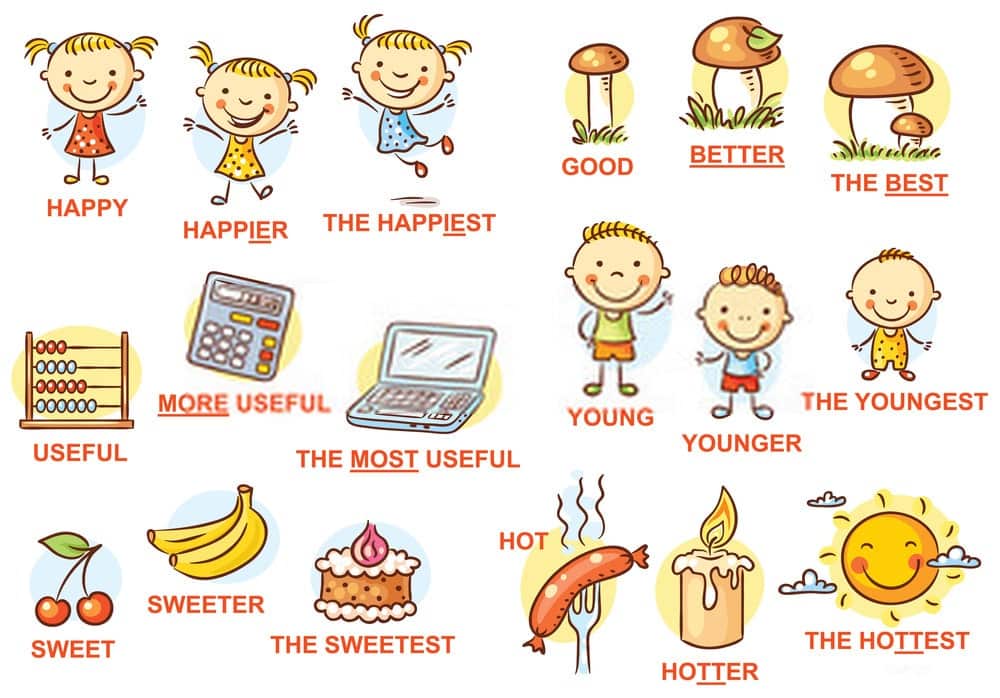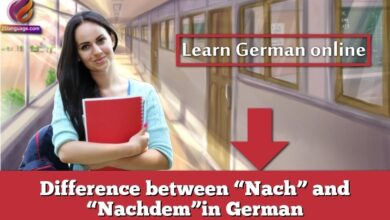Adjectives in German

Adjectives in German.In any language, adjectives serve as the building blocks that add color, dimension, and nuance to our words. They provide the descriptive power that allows us to go beyond mere functionality in language, moving us into a realm where we can express feelings, detail appearances, and clarify ambiguities.

Explanation about Adjectives in German
Types of Adjectives
- Attributive Adjectives: These adjectives come directly before the noun they describe and take an ending that corresponds to the gender, case, and number of the noun.
- Ein alter Mann (An old man)
- Eine junge Frau (A young woman)
- Predicative Adjectives: These adjectives come after the verb and don’t take any ending.
- Der Mann ist alt. (The man is old.)
- Die Frau ist jung. (The woman is young.)
- Comparative and Superlative: German adjectives can also take comparative and superlative forms.
- alt, älter, am ältesten (old, older, oldest)
- Adverbial use: In German, many adjectives can also be used as adverbs without any modification.
- Er spricht laut. (He speaks loudly.)
Declension of Adjectives
One of the complexities in the German language is the declension of adjectives. The ending of an attributive adjective changes based on the gender, number, and case of the noun it describes, and whether a definite or indefinite article precedes it.
- With Definite Article:
- Der alte Mann (Nominative)
- Dem alten Mann (Dative)
- With Indefinite Article:
- Ein alter Mann (Nominative)
- Einem alten Mann (Dative)
Position in Sentence
In German, the position of the adjective can change its role in the sentence:
- Attributive adjectives precede the noun.
- Ein schnelles Auto (A fast car)
- Predicative adjectives follow verbs like “sein” (to be), “werden” (to become), or “bleiben” (to stay).
- Das Auto ist schnell. (The car is fast.)
Examples fof using Adjectives in German
| German Adjective | German Sentence | English Translation |
|---|---|---|
| groß | Der Baum ist groß. | The tree is big. |
| klein | Die Katze ist klein. | The cat is small. |
| alt | Mein Opa ist alt. | My grandpa is old. |
| jung | Die Kinder sind jung. | The children are young. |
| schön | Das Bild ist schön. | The picture is beautiful. |
| hässlich | Das Gebäude ist hässlich. | The building is ugly. |
| schnell | Der Zug fährt schnell. | The train travels fast. |
| langsam | Die Schildkröte bewegt sich langsam. | The turtle moves slowly. |
| teuer | Das Auto ist teuer. | The car is expensive. |
| billig | Die Schuhe sind billig. | The shoes are cheap. |
| klug | Sie ist eine kluge Frau. | She is a smart woman. |
| dumm | Es wäre dumm, das zu tun. | It would be stupid to do that. |
| glücklich | Ich bin sehr glücklich. | I am very happy. |
| traurig | Er ist traurig. | He is sad. |
Phrases about Adjectives in German
| German Phrase | English Translation | Context or Usage |
|---|---|---|
| so groß wie | as big as | Used for equative comparison |
| größer als | bigger than | Used for comparative forms |
| am größten | biggest | Used for superlative forms |
| nicht so groß wie | not as big as | Used for negative equative comparison |
| ziemlich groß | quite big | Used to emphasize the size |
| sehr klein | very small | Used to emphasize the adjective |
| zu warm | too warm | Used to indicate excessiveness |
| etwas alt | somewhat old | Used to indicate a moderate degree |
| weder jung noch alt | neither young nor old | Used to indicate a middle ground |
| sowohl schön als auch hässlich | both beautiful and ugly | Used to indicate that both adjectives apply |
| überhaupt nicht teuer | not expensive at all | Used to strongly negate the adjective |
“In conclusion, adjectives serve as an indispensable tool in enriching our vocabulary and enhancing the clarity and vividness of our communication. Through precise and appropriate use of adjectives, we are better able to articulate ideas, invigorate narratives, and improve the quality of linguistic interaction.




























